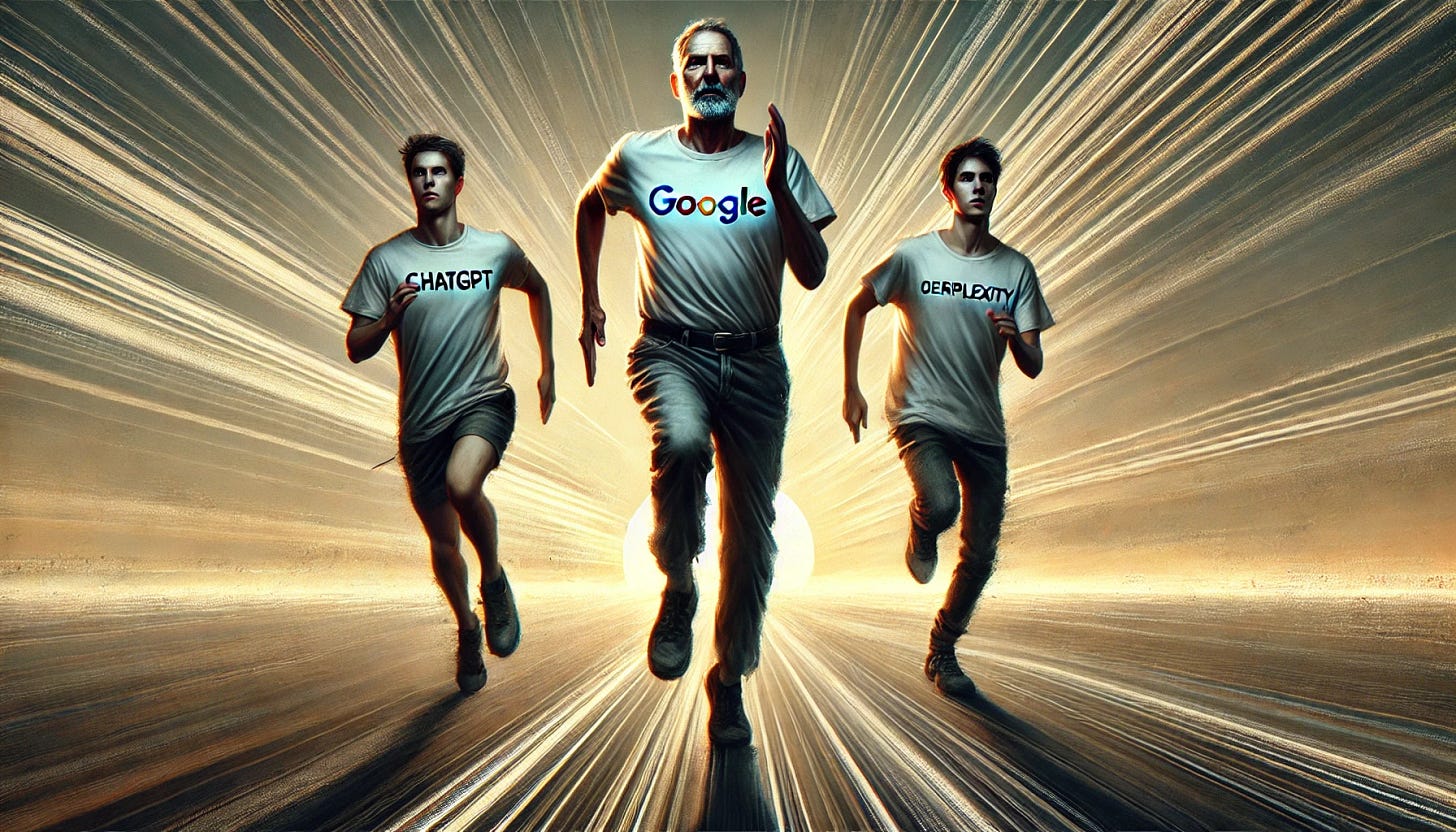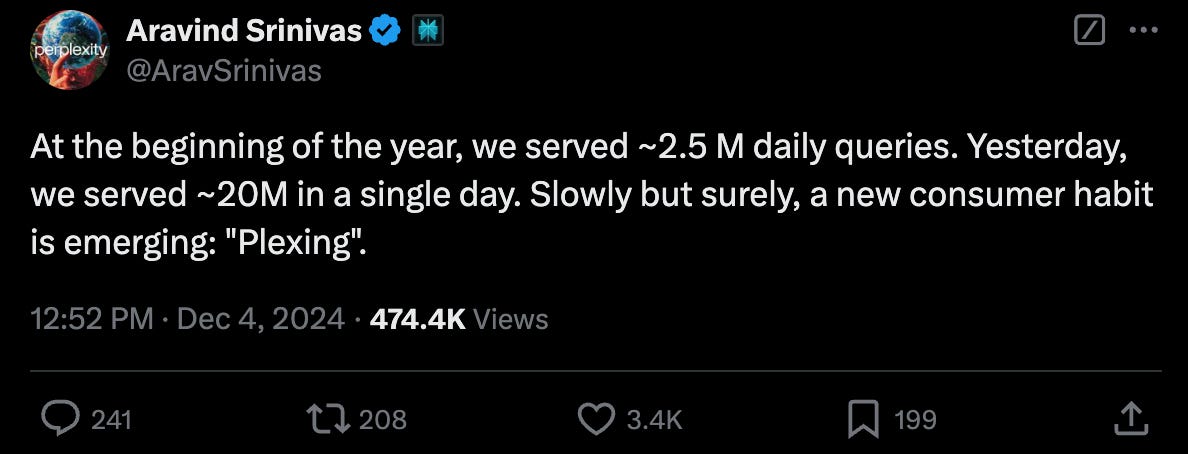Can Google Lose Its Monopoly In Search?
For years, the word 'search' has been synonymous with Google. But could the rise of Generative AI dethrone Google?
Let’s first look at Google’s dominance:
As of December 2024, Google is valued at $2.4 trillion, a remarkable achievement for a company that is only 26 years old. To give a sense of how far they’ve come since their inception, here’s a look at their annual revenue growth from 2002 to 2023:
A growth curve like this is extremely rare.
They have built an incredibly deep moat around themselves with superior technology, business model and connected ecosystem.
In this post, we'll focus solely on Google's Search business. To understand the extent of Google Search's dominance, consider the global market share of online search engines across all platforms:
Google processes 8.5 billion searches daily and can sift through over 40 billion indexed web pages in less than half a second, emphasizing its technological capabilities and efficiency in delivering results.
Can incumbents be disrupted?
With Google's vast competitive advantage, it's reasonable to consider them a monopoly in Search. The DOJ has even made this assertion in an antitrust case against Google (link). Together, rivals like DuckDuckGo, Bing, and others hold only about 10% of the market share, with Google dominating the remainder. How could an empire of this magnitude ever be overthrown?
I read an interesting Substack by
about how giant incumbent institutions have been disrupted by startups, and that the speed of this disruption is only increasing. The disruption is more often than not facilitated largely by a shift in technology, amongst other things.Some obvious examples of Incumbent vs Disruptor:
Yahoo vs Google
Blockbuster vs Netflix
Intel vs Nvidia
IBM vs Apple
And the list goes on. The above disruptors have had a fantastic runway in the post dotcom bubble era, and have now become ‘incumbent’ in their respective domains.
Gen AI ushers in a new form of Online Search:
Using AI tools for tasks like condensing lengthy texts, writing initial drafts, simplifying complex things and rewording content has proven to be remarkably effective and has significantly streamlined these previously time-consuming processes. And if that’s true, then Gen AI has the potential to redefine the way you Search the web.
First, let’s try to understand the different types of search intents users exhibit on Google Search and their % distribution. Broadly speaking, search intent is categorized as below:
There is no consensus study of this distribution that I could find. The above data is from Sparktoro and is relatively recent. There’s also an older study on ResearchGate, which reinforces the point I’m trying to make.
Informational search alone constitutes the majority of activity on Search. For the sake of this Substack, let’s focus on the top 2 items from this table, ie. Informational and Navigational.
Informational Search: This is the biggest area of opportunity for Gen AI. In a typical online search experience, users enter a question, a topic, or a set of keywords related to what they want to learn. They browse the results, looking for snippets that seem relevant. They typically end up clicking on multiple links and read content on different websites to gather information. This can become a time-consuming process, depending on what you’re looking for.
Perplexity, ChatGPT and other LLM powered search apps solve this exact problem for the users. They combine language models with real-time web search to deliver direct answers. It interprets queries using LLM, performs real-time searches, evaluates sources, and extracts content for generating accurate, concise answers with citations. In other words, they automate the process of going thru multiple links to get information by using LLMs for it. It features a conversational interface which ensures efficient, context-aware, and reliable search results. Why would you ever want to go back to legacy search after using this? Why would you want to see sponsored links before getting to the answer? Check out this Bloomberg article by Shirin Ghaffary on how users are dumping Google for AI Chatbots.Navigational Search: In this case, there’s very little that LLMs can do to add more value, as the users are looking for links to specific websites. It’s also hard to beat Google on the ranking algorithm and latency here. At least for now.
For transactional and commercial searches, Perplexity recently announced a shopping feature, which integrates product links from retailers like Amazon, BestBuy, Target, etc. and features a One-Click checkout button for Pro users. The jury is still out on whether users will migrate from Google to LLM search apps for product/service browsing due to limited advantages. If they can figure out a way to integrate product/service reviews to provide tailored links, this can be huge.
Adoption of LLM powered Search apps:
It would be futile to compare the new apps against Google at this point since it’s way too early and Google has had a 25+ years of head start ahead of them. But it would help to understand the rate of change of adoption and engagement so far for ChatGPT and Perplexity to get a sense of where they’re headed. So, let’s dive in.
Perplexity:
In a recent post on X, Aravind Srinivas, co-founder and CEO of Perplexity, posted the following:
That’s a ~700% growth in just a year.
Perplexity started the year with ~42 million visits across all devices in January 2024 and clocked ~142 million visits by November 2024. That’s a 238% increase in volume within the same year. (Source: Semrush)
Perplexity has a total of 15 million Monthly Active Users (MAU as of Aug 2024) which is 150% growth from 10 million MAU in January 2024. It’s Daily Active Users crossed 2 million mark (Source: Wired, Similarweb).
Additionally, Aravind Srinivas recently posted a comparison of Day 7 retention metric of LLM apps on iOS, which shows Perplexity scoring higher than all other leading apps - Gemini, Copilot and ChatGPT:ChatGPT:
OpenAI recently posted adoption numbers on X which tells the story of a product that’s well on its way to becoming an omnipresent product like Google:
In November 2023, Sam Altman had announced the Weekly Active Users for ChatGPT crossing 100 million mark. That’s a 200% growth YoY for a product that’s already a market leader in the space.
Let’s not forget the fact that ChatGPT had 100 million users in its second month of launch. Just for reference, it took Facebook ~4.5 years, Twitter ~5 years and Instagram 2+ years to get there.
Average time spent by users on Google is just under 1 minute, whereas for ChatGPT it’s ~13.5 minutes according to Statista. This shows that users are more engaged on ChatGPT.
Looking ahead - what does this mean?
It’s undeniable that the concept of "Search" is undergoing a profound transformation. The familiar experience we've had with legacy Google is becoming obsolete. After using tools like Perplexity and ChatGPT, it’s hard to envision reverting to traditional Google for informational searches. This sentiment is echoed by everyone I’ve introduced to these platforms—they share a similar shift in preference.
So, what does this mean for Google? While the company has previously stumbled in rolling out AI-driven products and taken a backseat in the AI race despite having world-class talent, they appear to be regaining momentum. Their recent AI initiatives, such as NotebookLM and Veo2, signal progress (learn more here). Crucially, Google has virtually unlimited financial resources at its disposal.
That said, I believe Search is on the cusp of a complete reinvention, likely signaling the end of Google’s "10 blue link" business model. Even if Google excels in delivering exceptional AI-powered solutions, competitors will remain close on their heels, as evidenced by recent AI benchmarks. This shift is poised to create a more competitive landscape, offering users a broader array of search options. Ultimately, the search industry’s business model will need a significant overhaul.










